|
|
|
Sort Order |
|
|
|
Items / Page
|
|
|
|
|
|
|
| Srl | Item |
| 1 |
ID:
186605
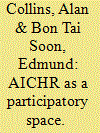

|
|
|
|
|
| Summary/Abstract |
The ASEAN Intergovernmental Commission on Human Rights (AICHR) is often regarded unfavourably, depicted at best as irrelevant in the battle to promote and protect human rights in Southeast Asia, and at worst, complicit in the abuse of human rights by its silence in the face of the region's human rights' tragedies. While AICHR has many limitations, we regard it as a work-in-progress, evolving as it was always meant to. To understand this evolution, we conceive of AICHR as a participatory space in which contestation of what AICHR can, and cannot, do is being undertaken by its Representatives. This contestation includes exposing its secretive face of power by revealing: the space human rights can be discussed in; who can participate and who is excluded in this discussion; and how malleable the norms that operate within this space are to change. The latter aspect of contestation engages with the thorny ‘problem’ of consensus. We argue that the presence of Representatives from outside of government has introduced a desire in AICHR for change; a dynamism that makes it a participatory space witnessing contestation that has the potential to enable AICHR to evolve. A space, therefore, that for all its shortcomings is worth watching.
|
|
|
|
|
|
|
|
|
|
|
|
|
|
|
|
| 2 |
ID:
132332
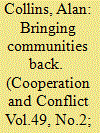

|
|
|
|
|
| Publication |
2014.
|
| Summary/Abstract |
The Association of Southeast Asian Nations (ASEAN) is building a people-oriented community in Southeast Asia and it has all the hallmarks of a Deutschian security community, with its emphasis on people-to-people contact and the involvement of civil society organisations in the community's creation. In this article the argument is made that it is precisely the involvement of the masses that creates the peace inertia associated with security communities, and thus ASEAN's plural turn is an essential first step in making ASEAN's community a security community. Whether ASEAN can actually do this, and indeed whether the membership are united in this objective, is not the focus for this article. Instead, and contrary to the security community literature, which identifies ASEAN as a non-liberal security community and has emphasised the practice of self-restraint, this article argues that past ASEAN practice has prevented a security community forming in Southeast Asia, and using self-restraint as an explanation for why security communities create dependable expectations of peaceful change for members has resulted in the agency of 'community' being neglected. Hence, this article argues for the need to bring 'community' back.
|
|
|
|
|
|
|
|
|
|
|
|
|
|
|
|
| 3 |
ID:
055732
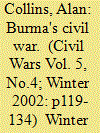

|
|
|
| 4 |
ID:
095439
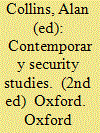

|
|
|
|
|
| Edition |
2nd ed
|
| Publication |
Oxford, Oxford University Press, 2010.
|
| Description |
xxxi, 542 p.
|
| Standard Number |
9780199548859, pbk
|
|
|
|
|
|
|
|
|
|
|
|
Copies: C:1/I:0,R:0,Q:0
Circulation
| Accession# | Call# | Current Location | Status | Policy | Location |
| 054885 | 355.033/COL 054885 | Main | On Shelf | General | |
|
|
|
|
| 5 |
ID:
077592
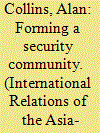

|
|
|
|
|
| Publication |
2007.
|
| Summary/Abstract |
At its Ninth Summit in October 2003 the Association of South East Asian Nations (ASEAN) announced its intention to create an ASEAN Community based upon three pillars: ASEAN Economic Community, ASEAN Security Community and an ASEAN Socio-Cultural Community. A year later ASEAN established the Vientiane Action Programme to realise this goal. The official discourse of community building is complemented by a vibrant academic debate over whether ASEAN's norms indicate that it is a nascent security community ready to transform itself into a fully-fledged security community. In this article I argue that ASEAN has never been a nascent security community but has instead been a security regime and therefore its norm compliance does not provide evidence of community building. If ASEAN is to form a security community then new socialising norms will need to emerge, which will need to include the active involvement of regional civil society organisations in order to bring plurality to ASEAN decision making. Only then will the people of ASEAN be able to take ownership of the community building process.
|
|
|
|
|
|
|
|
|
|
|
|
|
|
|
|
| 6 |
ID:
165869


|
|
|
|
|
| Summary/Abstract |
Whether it is the persecution of the Rohingya, the disappearance of human rights activists, the general limiting of freedom of speech across the region, or the resumption of the arbitrary use of the death penalty, Southeast Asia can be said to be facing a human rights crisis. This human rights crisis is though occurring at a time when the region’s institution, the Association of Southeast Asian Nations (ASEAN), has never been so interested in human rights. After a lengthy period of time in which ASEAN either ignored, or paid lip service to human rights, the Association has created a human rights body – the ASEAN Intergovernmental Commission on Human Rights (AICHR) – and adopted an ASEAN Human Rights Declaration (AHRD). In this article, I utilize the Spiral Model to explain how, when ASEAN member states are regressing in their commitment to human rights, an intergovernmental body continues to promote their commitment and lay the groundwork for their compliance.
|
|
|
|
|
|
|
|
|
|
|
|
|
|
|
|
| 7 |
ID:
123004
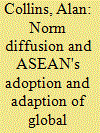

|
|
|
|
|
| Publication |
2013.
|
| Summary/Abstract |
This article examines the diffusion of norms from a global actor, the Joint United Nations Programme on HIV/AIDS (UNAIDS), to the Association of Southeast Asian Nations (ASEAN). This entails using three processes of norm diffusion (localization, subsidiarity, and mimetic adoption) to examine and explain the adoption and adaption of global norms in the Association's four ASEAN Work Programmes (AWPs) on HIV/AIDS. In so doing, the article reveals that these different processes can be seen at work in different AWPs. The article also reveals the limitations of the AWPs and hence the lack of a coordinated regional response to the virus.
|
|
|
|
|
|
|
|
|
|
|
|
|
|
|
|
| 8 |
ID:
068690
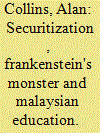

|
|
|
| 9 |
ID:
058305
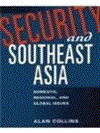

|
|
|
|
|
| Publication |
New Delhi, Viva Books, 2005.
|
| Description |
ix, 245p.
|
| Standard Number |
8176498718
|
|
|
|
|
|
|
|
|
|
|
|
Copies: C:1/I:0,R:0,Q:0
Circulation
| Accession# | Call# | Current Location | Status | Policy | Location |
| 049026 | 355.033059/COL 049026 | Main | On Shelf | General | |
|
|
|
|
| 10 |
ID:
047294


|
|
|
|
|
| Publication |
Edinburgh, Keele University Press, 1997.
|
| Description |
243p.
|
| Standard Number |
1853311952
|
|
|
|
|
|
|
|
|
|
|
|
Copies: C:1/I:0,R:0,Q:0
Circulation
| Accession# | Call# | Current Location | Status | Policy | Location |
| 044706 | 327.101/COL 044706 | Main | On Shelf | General | |
|
|
|
|
| 11 |
ID:
168497


|
|
|
|
|
| Summary/Abstract |
This article uses the reflection on the direction (whither) and health (wither) of constructivism and the Association of Southeast Asian Nations (ASEAN) that was witnessed in 2017 to see what these deliberations reveal about the fixity of norms and their contestation. The argument presented is that constitutive norms create fixed parameters of shared understandings but that within those parameters the meaning and application of the norm can be contested and debated. This insight helps to bridge the gap between conventional and critical constructivists and shows that the premise of jettisoning the ASEAN Way as necessary for ASEAN to achieve its ambitious community-building project is flawed. The argument relies on insights from the constructivist literature on norm degeneration to show how contestation is not one part of a norm’s life cycle but rather a constant companion. However, norms are not just contested, but they have fixity, and here practice theory can help show that the social world is just as much about continuity as it is change. The ASEAN case study is timely as introspection about the efficacy of its constitutive norms – the ASEAN Way – was prominent in 2017 as ASEAN turned 50.
|
|
|
|
|
|
|
|
|
|
|
|
|
|
|
|
|
|
|
|
|